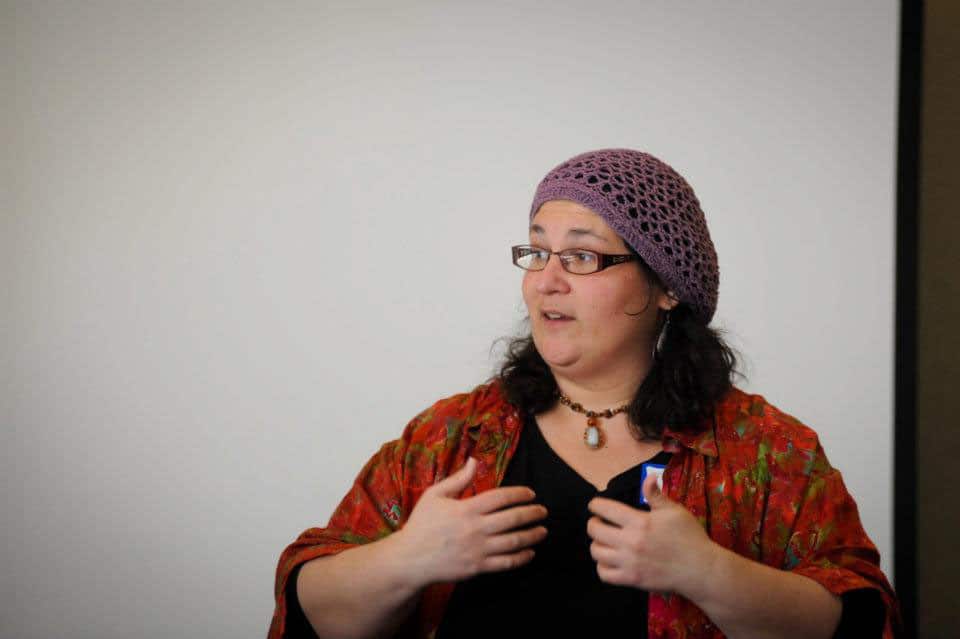 Rabbi Minna Bromberg
Rabbi Minna Bromberg Rabbi Minna Bromberg was at a Chanukah party at her daughter’s gan, where everyone was invited to eat sufganiyot. When the song leader told the room, which was full of two- to five-year-olds and their parents of all sizes, that they should get back to dancing unless they’ve gotten too fat from all those sufganiyot, Bromberg was aghast.
“I was mortified by his implicit judgment of my own fat body and I was angered that he would say such a thing about bodies in general to a room full of young children, but I was also filled with this knowing: Chanukah is a holiday that is a celebration of fat, literally,” she said. “We eat fried foods to commemorate fat as a symbol of our people’s miraculous revival and endurance.”
Bromberg, who is based in Jerusalem and has spent 30 years as a fat activist and 10 years in the rabbinate, had an idea: She would create an organization called Fat Torah to combat fatphobia in the Jewish community and deploy Jewish tradition for the liberation of all bodies.
Through the organization, Bromberg and her Social Media and Development Coordinator Emily Rogal provide trainings to faculty and staff at Jewish communal organizations, run workshops for congregations and Hillels, mentor and supervise individuals who want to apply a Fat Torah lens to their life and/or work, and nurture a growing online community of people who are passionate about body liberation and Jewish life.
“There is already excellent research out there to support the sad fact that fat people are discriminated against in healthcare, employment, education, public accommodations and beyond,” she said. “Weight stigma also impacts people of all sizes, causing body dissatisfaction and leaving people at increased risk of eating disorders. I don’t believe that Jewish communities are necessarily worse at dealing with weight stigma than other parts of the world, but we certainly aren’t immune from the stigmatizing effects of anti-fatness either.”
“I don’t believe that Jewish communities are necessarily worse at dealing with weight stigma than other parts of the world, but we certainly aren’t immune from the stigmatizing effects of anti-fatness either.”
One of Bromberg’s favorite, but most heartbreaking, facets of her work is connecting with people who have dealt with weight stigma in the Jewish community. She’s heard from clergy who are given unwanted “advice” and commentary on their bodies from congregants and colleagues, and congregants who feel unwelcome in their communities because of the fat-shaming in which their clergy publicly engage. Bromberg also works with single people with concerns about shidduch issues—those who are told they can’t find a partner due to their size—or people who are fat-shamed at the mikvah.
“[There is] the endless pervasiveness of diet culture at every communal event (whether in-person or by Zoom) which can be deeply and immediately harmful to anyone trying to recover from disordered eating,” she said. “Lifting up these voices and these stories is a core part of Fat Torah’s work.”
According to Bromberg, there are various ways to fight back against fat stereotypes and discrimination against fat people within Jewish communal spaces. For instance, it’s important to make sure that gathering places are physically accessible to people of all sizes and to stop complimenting weight loss and educate others on it, too.
“We often don’t know the cause of the weight loss and could inadvertently be ‘complimenting’ an underlying illness that causes weight loss, grief, depression and/or disordered eating,” she said. “When we publicly compliment weight loss we signal not only to the person we are complimenting but to everyone around them that they are more acceptable in a thinner body (and were therefore less acceptable in a larger body).”
Bromberg also believes the movement needs to start at home with individuals who commit to working on their relationship with their own bodies. “People who learn to accept their own bodies are more likely to be able to extend that acceptance to others as well,” she said.
When it comes to fat-shaming and fat acceptance, it’s crucial to look at the bigger picture. Bromberg cited the fact that all human beings are created in the Divine image, which means that fat bodies are no less Godly or worthy of human dignity and basic respect than thinner bodies.
“We have this wonderful midrash (in the Mishnah Sanhedrin 4:5) that describes how when a human king stamps coins in his image they all look the same, but when God creates humans in the divine image we all look different,” she said. “The diversity of human bodies is here being extolled as a marker of God’s greatness; at Fat Torah we aim to insure that body diversity can truly be celebrated in this way in our Jewish communities.”























 More news and opinions than at a Shabbat dinner, right in your inbox.
More news and opinions than at a Shabbat dinner, right in your inbox.